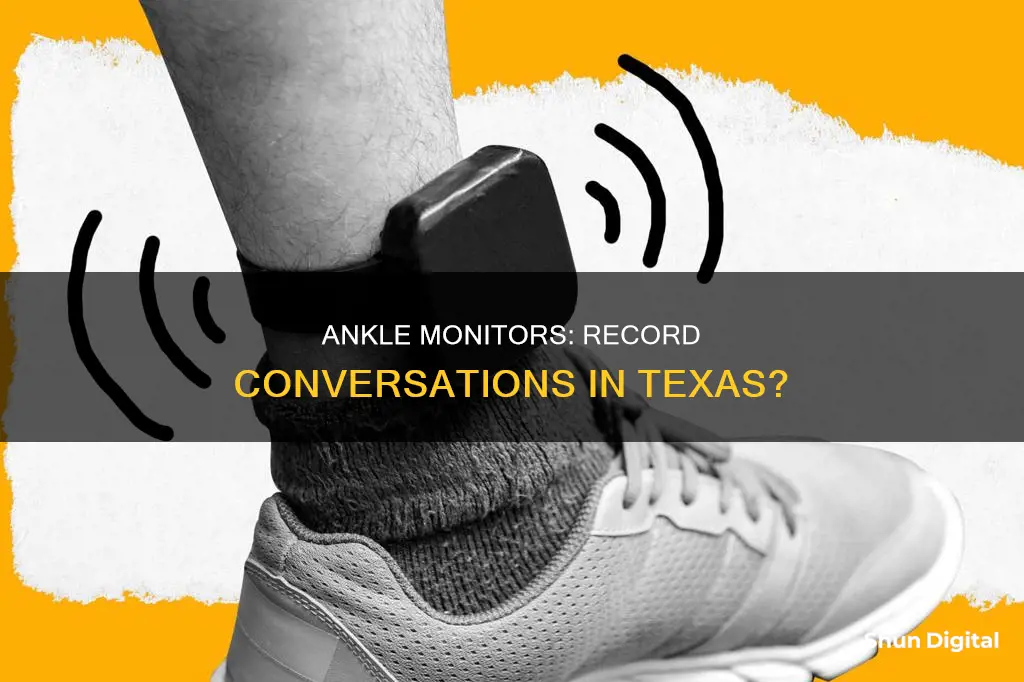
Ankle monitors are often used as a sentencing option to help defendants avoid jail time. However, there are concerns that these devices may be violating the constitutional rights of those who wear them. In addition to tracking location, some ankle monitors have the ability to record conversations without the wearer's consent, raising questions about privacy and dignity. This capability has sparked debates about the balance between public safety and individual rights, with advocates arguing that it invades privacy and others claiming that it is necessary for supervision and rehabilitation. The use of these advanced features and their potential implications for justice and liberty is a complex issue that requires careful consideration.
| Characteristics | Values |
|---|---|
| Location tracking | Yes |
| Two-way communication | Yes |
| Recording conversations | Yes |
| Warning before recording | Sometimes |
| Vibration before recording | Sometimes |
What You'll Learn

Ankle monitors can record without warning
Ankle monitors have become an increasingly common tool in the criminal justice system, with over 100,000 people in the United States under some form of electronic monitoring. While the primary purpose of these devices is to track an individual's location, they have also raised concerns about potential invasions of privacy.
Ankle monitors have been known to be equipped with speakers and microphones, enabling two-way communication between the wearer and law enforcement. While this feature can be used to remind individuals of upcoming court dates or to issue warnings about potential violations, it also raises concerns about eavesdropping. In 2014, a technician testified that the Track Group's ReliAlert XC3 device could be activated without warning, allowing officials to listen in on conversations without the wearer's knowledge.
This capability has significant implications for privacy and confidentiality, especially when it comes to attorney-client conversations. Civil libertarians and prisoner advocacy groups argue that the ability to record conversations without consent violates the Fourth Amendment, the Federal Wiretap Act, and individual state constitutions.
While proponents of ankle monitors argue that warning alerts are in place to notify the wearer when recording begins, critics point out that these alerts can be bypassed without informing the defendant. This lack of warning raises serious concerns about the potential for abuse and the invasion of privacy.
The issue of consent is crucial in this debate. While individuals may consent to wear an ankle monitor as a condition of their probation or house arrest, it does not necessarily mean they consent to constant surveillance. The line between monitoring and privacy invasion is a fine one, and the potential for abuse of power is ever-present.
While there have been no reported cases of the state abusing the microphone feature in California or elsewhere, the very presence of this capability is concerning to many. The balance between public safety and individual privacy is a delicate one, and the use of ankle monitors that can record without warning underscores the complexities of this debate.
Efficiently Remove Uninstalled Monitors: A Step-by-Step Guide
You may want to see also

Ankle monitors can record privileged conversations
Ankle monitors have been a subject of debate in the criminal justice system, with some arguing that they are a violation of privacy and others advocating for their use as a means of reducing incarceration rates. One of the primary concerns surrounding ankle monitors is their potential to record conversations without the wearer's consent. This capability raises questions about the legality and ethical implications of such devices, particularly when privileged conversations with attorneys may be recorded.
In Texas, the use of ankle monitors as an alternative to incarceration is not uncommon. While the primary function of these monitors is to track an individual's location through GPS, there have been concerns that they may also be used to eavesdrop on conversations. This is a significant issue as it could potentially violate the constitutional rights of those wearing the devices.
The Fourth Amendment, which protects the right to privacy, and the Federal Wiretap Act are often cited by prison advocacy groups and civil libertarians as being violated by the use of these recording devices. Additionally, the right to avoid self-incrimination, as guaranteed by the Fifth Amendment, may also be infringed upon if individuals are unaware that their conversations are being recorded.
Proponents of ankle monitors argue that they provide audio alerts and vibrations to notify the wearer when a recording is being made. However, there have been instances where these alerts have failed to activate, or where the police or monitoring companies have bypassed them without informing the defendant. This uncertainty surrounding the activation of recording capabilities has led to concerns about the potential for abuse.
The impact of ankle monitors that can record conversations extends beyond the individual wearing the device. Third-party privacy rights may also be violated as conversations with family, employers, or attorneys become exposed to government surveillance. While some states, like Illinois and California, have wiretapping laws that forbid recording without the consent of all parties, the mere capability of these devices to record privileged conversations is a cause for concern.
The debate surrounding ankle monitors that can record conversations is complex. While these devices offer an alternative to incarceration and may help reduce reoffending rates, the potential invasion of privacy and violation of constitutional rights cannot be ignored. The challenge lies in balancing the benefits of community supervision with the need to protect the rights and dignity of those under monitoring.
Turning Off Splendid Demo Mode on ASUS Monitors
You may want to see also

Ankle monitors can violate constitutional rights
Ankle monitors are increasingly being used as a sentencing option to help defendants avoid jail time. Courts may impose "house arrest", allowing defendants to continue with their daily lives while being monitored. This is done through electronic ankle bracelets with GPS tracking capabilities. However, concerns have been raised about the potential violation of constitutional rights, specifically the Fourth Amendment, the right against unreasonable searches and seizures, and the Fifth Amendment, the right to avoid self-incrimination.
One of the main concerns is the ability of these devices to eavesdrop and record conversations without the wearer's knowledge. Prison advocacy groups and civil libertarians argue that this is a clear violation of privacy and the right to avoid self-incrimination. They claim that law enforcement or private security companies can listen to privileged conversations, including those with attorneys, which violates attorney-client confidentiality. Additionally, there are concerns about the potential for third-party privacy rights violations, as conversations with family or employers could be exposed to government surveillance.
Proponents of ankle monitors argue that there are warning vibrations and sounds when the device is activated, notifying the wearer. However, this claim has been disputed, and it is argued that these alerts can be bypassed without the wearer's knowledge. The issue of consent is also questioned, as individuals may not be fully aware of the capabilities of the devices they are consenting to wear.
The use of ankle monitors raises complex legal and ethical questions. While they can be a useful alternative to incarceration, the potential for privacy and constitutional rights violations is a significant concern that needs to be carefully considered and addressed to ensure that any developments in criminal justice are in line with justice and respect for individual rights.
Differentiating DHI and UHD Monitors: A Quick Guide
You may want to see also

Ankle monitors can be bypassed by police
Ankle monitors are increasingly being used as a sentencing option to help defendants avoid jail time. This type of sentence, known as "house arrest", allows individuals to continue with their daily lives while being monitored by law enforcement. One of the most common ways to do this is through the use of electronic ankle bracelets with GPS tracking capabilities.
However, many of these devices also have the ability to record conversations without the wearer's consent, raising concerns about violations of constitutional rights, particularly the Fourth Amendment, the Federal Wiretap Act, and individual state constitutions. This has sparked debates about privacy and dignity, with some arguing that the ability to eavesdrop on privileged conversations, including those with attorneys, is a massive invasion of privacy.
While proponents of ankle monitors argue that there are audio alerts and vibrations to notify the wearer when the device is activated, this claim has been disputed. In a case in Puerto Rico, it was found that these alerts could be bypassed by police or monitoring companies without the defendant's knowledge. This lack of warning and the potential for constant surveillance underscore the concerns surrounding the use of these devices.
The ability to bypass the alerts on ankle monitors raises significant ethical and legal questions. While the intention may be to ensure compliance with court-imposed conditions, the potential for abuse and invasion of privacy is undeniable. This is especially concerning given the number of individuals under electronic monitoring, which exceeds 100,000 on any given day.
As technology continues to advance, it is crucial to strike a balance between monitoring and surveillance while respecting the privacy and dignity of those under supervision. The use of ankle monitors that can be bypassed by police underscores the delicate nature of this balance and the need for careful consideration of the implications for civil liberties.
In-Ear Monitors: Buying Guide for Musicians
You may want to see also

Ankle monitors can reduce reoffending
Secondly, ankle monitors with GPS tracking capabilities enable law enforcement to monitor an individual's whereabouts at all times, ensuring they abide by the conditions set by the court, such as sticking to a specific area or maintaining a required distance from certain individuals. This real-time tracking information can help prevent further offenses and provide evidence of any violations.
Additionally, ankle monitors can be equipped with alcohol-detecting technology, such as the Secure Continuous Remote Alcohol Monitor (SCRAM) bracelet, which can detect alcohol in a person's sweat. This feature not only helps ensure compliance with court-ordered sobriety but also facilitates their participation in drug and alcohol treatment programs from the comfort of their homes.
The use of ankle monitors as an alternative to incarceration has gained popularity in recent years, particularly in Washington State, where thousands of residents have utilized SCRAM bracelets as part of their alternative sentences. This trend is driven by the cost-effectiveness of these devices and their proven success in deterring reoffending.
While ankle monitors can be an effective tool in reducing reoffending rates, it is important to consider the potential invasion of privacy and the financial burden they may place on individuals, particularly those from low-income backgrounds.
Kindle Fire to Monitor: Easy Steps for Connection
You may want to see also
Frequently asked questions
Ankle monitors can record conversations, but it is unclear if they are used in Texas. The ReliAlert XC3, a device manufactured by the Track Group, is capable of recording conversations.
No, it is not legal for the state to use the built-in microphone to do anything other than verify the identity of the wearer. Any other conduct would likely be a violation of the Fourth Amendment and possibly the Fifth Amendment.
Ankle monitors are supposed to alert the wearer when they are being recorded, but there have been reports of conversations being recorded without notification.







